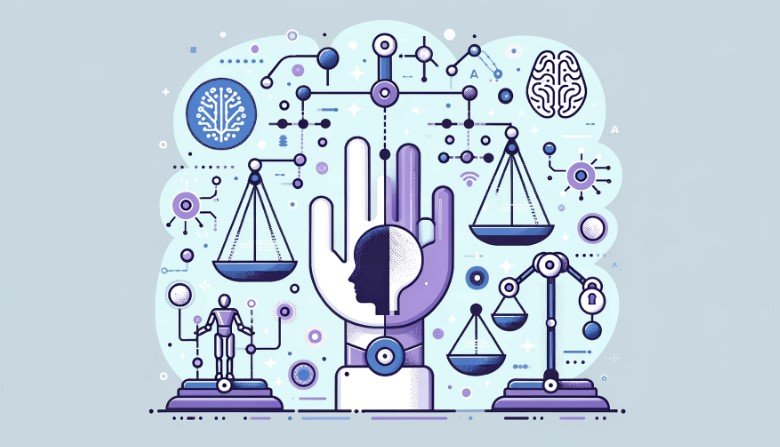The rapid advancement of artificial intelligence (AI) technology has ushered in a new era of possibilities, transforming the way we live, work, and interact with the world around us. As AI systems become increasingly integrated into various aspects of daily life, the importance of ethical considerations cannot be overstated. Striking a balance between harnessing the potential of AI and ensuring that its deployment is responsible, fair, and transparent is essential for fostering trust and safeguarding societal values. This article delves into the ethical implications of AI, explores frameworks for responsible innovation, and highlights the critical role of stakeholders in shaping an ethical AI landscape.
Understanding AI Ethics
AI ethics encompasses a broad range of considerations aimed at guiding the development and deployment of AI technologies. These ethical concerns often revolve around fairness, accountability, transparency, privacy, and security. As AI continues to proliferate, the potential for biases ingrained in algorithms poses significant challenges. Ensuring inclusivity and fairness, while avoiding discriminatory practices, is crucial. Moreover, the decision-making processes of AI systems require transparency for users to understand how and why certain outcomes are determined, fostering trust and accountability.
The Importance of Fairness in AI
Fairness is a key principle in AI ethics, referring to the impartial and just treatment of individuals regardless of their background or personal characteristics. Algorithms that perpetuate bias can lead to systemic inequalities, affecting choices in hiring, lending, law enforcement, and more. To establish fairness in AI, developers must employ diverse training data that adequately represents various demographics and perspectives. Additionally, rigorous testing and auditing must be performed to detect any potential biases within AI systems before their widespread deployment.
Accountability and Responsibility
As AI systems assume greater roles in decision-making processes, the question of accountability becomes paramount. Who is responsible when an AI system makes an erroneous decision with significant consequences? Clear delineation of responsibility — whether on the part of developers, corporations, or end-users — is necessary to address potential harms. Establishing accountability frameworks can help ensure that stakeholders are held to ethical standards, and can include mechanisms for oversight and response to grievances arising from AI-related decisions.
The Need for Transparency
Transparency in AI systems promotes trust and understanding among users and stakeholders. To foster transparency, developers should document and communicate the methodologies, data sources, and rationale behind algorithmic designs. Providing clear insights into how decisions are made allows users to engage critically with AI technologies rather than blindly accept results. Initiatives like explainable AI (XAI) endeavour to enhance transparency by making AI systems’ reasoning processes accessible and interpretable.
Privacy Concerns in the Age of AI
With AI systems often reliant on vast amounts of personal data, privacy concerns have become increasingly significant. The collection, storage, and analysis of sensitive information necessitate stringent privacy measures to protect individuals’ rights. Implementing data minimization principles—where only essential data is collected—can help mitigate privacy risks. Additionally, transparent consent processes and the ability for individuals to control their data provide critical layers of protection in an era of AI-driven solutions.
The Role of Regulations and Policies
To cultivate an ethical AI environment, the establishment of regulatory frameworks and policies is essential. Governments and organizations are beginning to recognize the importance of formulating guidelines that address AI ethics while promoting innovation. Collaborative efforts between policymakers, industry leaders, ethicists, and technologists can work toward creating comprehensive regulations that balance innovation with ethical considerations. Additionally, international cooperation will be vital in addressing the global challenges presented by AI technologies.
Stakeholders in AI Ethics
Engaging a diverse range of stakeholders is crucial for shaping ethical AI practices. Stakeholders include not only AI developers and corporations but also consumers, civil society, and academia. Involving these groups in discussions about AI ethics fosters a holistic understanding of the implications AI technologies may have on society. Collaborative efforts can lead to the development of best practices, guiding principles, and ethical standards that promote responsible innovation.
Building an Ethical AI Culture
Creating a culture of ethical AI requires a commitment at every level of an organization. Companies should prioritize training and education on ethical AI practices, ensuring that employees are aware of the potential implications of their work and instilling a sense of responsibility. Establishing ethical review boards can facilitate discussions around AI innovations, providing a platform to assess ethical dilemmas and encourage reflection on broader societal impacts.
The Future of AI Ethics
As AI technologies continue to evolve, so too must our approach to ethics in this field. To remain relevant, ethical frameworks should adapt to emerging challenges, considering the far-reaching implications of AI on various aspects of life. Ongoing dialogue, research, and collaboration among stakeholders will be vital for addressing ethical concerns and ensuring that AI is developed responsibly. By fostering an ethical mindset alongside technological innovation, we can navigate the complexities of AI and work towards a future where responsible AI contributes positively to society.
Conclusion
The intersection of AI and ethics represents a fundamental challenge in today’s rapidly changing technological landscape. Emphasizing fairness, accountability, transparency, privacy, and inclusivity will help steer AI development in a direction that reflects societal values and upholds individual rights. By engaging all stakeholders in the conversation and implementing robust policies and regulations, we can ensure that the promise of AI is realized responsibly and ethically, paving the way for a future where technology serves the greater good. So, it is crucial to continue the conversation and actions towards ethical AI to ensure a better future for all. Ultimately, it is up to us as individuals and as a society to shape the direction of AI and create an ethical framework that aligns with our values. Only then can we fully embrace the potential of AI while safeguarding against its potential risks. As such, let us continue to prioritize ethics in AI development and work towards creating a responsible and inclusive technological landscape for all. The future of AI is in our hands, and it is our responsibility to steer it towards a better tomorrow.

